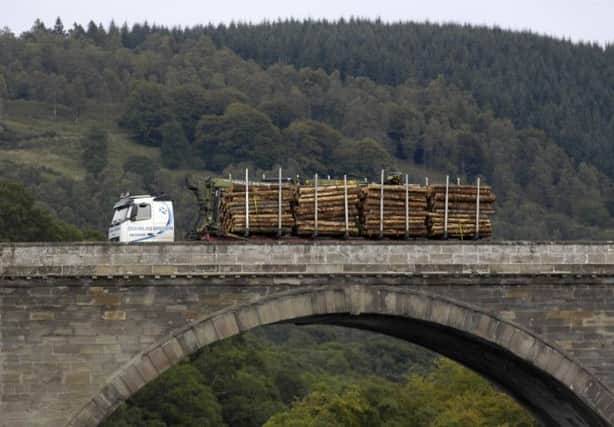Stuart Goodall: Scotland’s economy needs forestry


In recent years, there has been tremendous growth in Scotland’s forestry and timber sector and with demand for wood products so strong, there is real confidence in the future. The food and drink sector has also shown growth with an increasing focus on exports.
As they look to the future, different sectors must be open-minded, exploring opportunities to work together in the best interests of the rural economy – not digging heels in, taking up fixed positions or presenting everything as an either-or choice.
Advertisement
Hide AdAdvertisement
Hide AdAs chief executive of Confor, the leading forestry and timber trade body, I take my responsibility seriously to speak up for my members – but I also recognise the benefit of working constructively with other sectors. I have had many positive discussions with the farming community about how they can benefit from forestry as well as explaining the needs of the forestry and timber sector in Scotland. Many farmers recognise they can embrace forestry profitably as part of their land management activities.
In that context, I am disappointed with recent comments from the National Farmers Union of Scotland arguing for a scaling down of forestry targets and a shift of Scottish Government resources from forestry to farming.
The sums of public money going to forestry are tiny compared with farming – less than £40 million a year against around £600m for farming. In addition, the forestry money is spent on recompensing owners of woodland for lost income when providing environmental or recreational benefits, or as an investment in planting new woodlands. These are essentially one-off payments, not ongoing subsidies, which deliver huge benefits to Scotland.
No-one questions the value of farming and the wider food and drink sector to Scotland; it is a great success story. But so is forestry and timber, which supports 40,000 jobs and adds £1.7 billion in annual value to Scotland’s economy.
More trees need not be bad news for farming. Between 1960 and 1990, we saw the greatest era of forest expansion in Scotland – but over the same period, the total number of sheep in Scotland rose from 8.4 million to 9.9 million. During the past decade, when forest creation has been at an all-time low, there has been a drop in the number of breeding ewes. Tree planting can be an attractive and viable option for many farmers. It can provide shelter for animals, diversify a farm’s activity, allow the farmer to focus effort on more productive land, deliver a large future capital sum and offer the opportunity to make a big contribution to reducing carbon.
Forestry is central to meeting Scotland’s world-leading climate change targets – from planting the tree to using it as a low-carbon, everyday material, it delivers a unique combination of income, jobs and carbon reduction.
Let me be clear – Confor is not advocating covering prime agricultural land with trees or seeking to blanket the hills with new planting; our modest ambitions are focused on lower-quality land. Modern forestry standards mean tree planting is designed to fit in with the local landscape, providing open space for access and recreation and encouraging biodiversity. Such newly created forests include a mixture of tree species.
At its heart, we are talking about a modest target – 6,000 hectares of new commercial planting each year for ten years, to provide long-term confidence of supply to companies who make products we all take for granted – timber frames for houses, furniture, pallets, fencing and decking.
Advertisement
Hide AdAdvertisement
Hide AdForestry is a very significant economic activity, which will be borne out soon by a major study on the relative economic impacts of farming and forestry in southern Scotland. In economic terms, forestry delivers more back to the land manager than much upland sheep farming, supports more jobs and generally pays higher wages – good news for workers and the local economy.
There is also a genuine opportunity for farmers to benefit economically. Downgrading forestry would be bad for farmers, as well as bad for Scotland and disastrous for the forestry sector and those 40,000 jobs.
Our doors – and minds – are always open and I hope the farming community will also rise to the challenge and engage in the constructive dialogue we all need for rural Scotland to flourish. We are not saying forestry is the way forward for all farmers – just that it is worth considering, as the benefits it offers are very significant.
Let’s grasp the opportunity to make forestry and farming work. A thriving rural economy really is in everyone’s best interests.
• Stuart Goodall is chief executive of Confor and a speaker at Building on Success: The Future of Forestry and Timber in Scotland, 29 May.
SEE ALSO